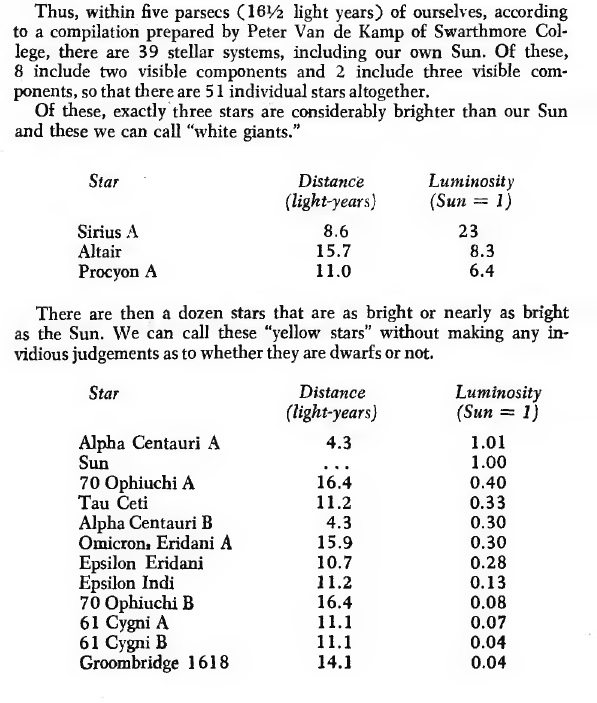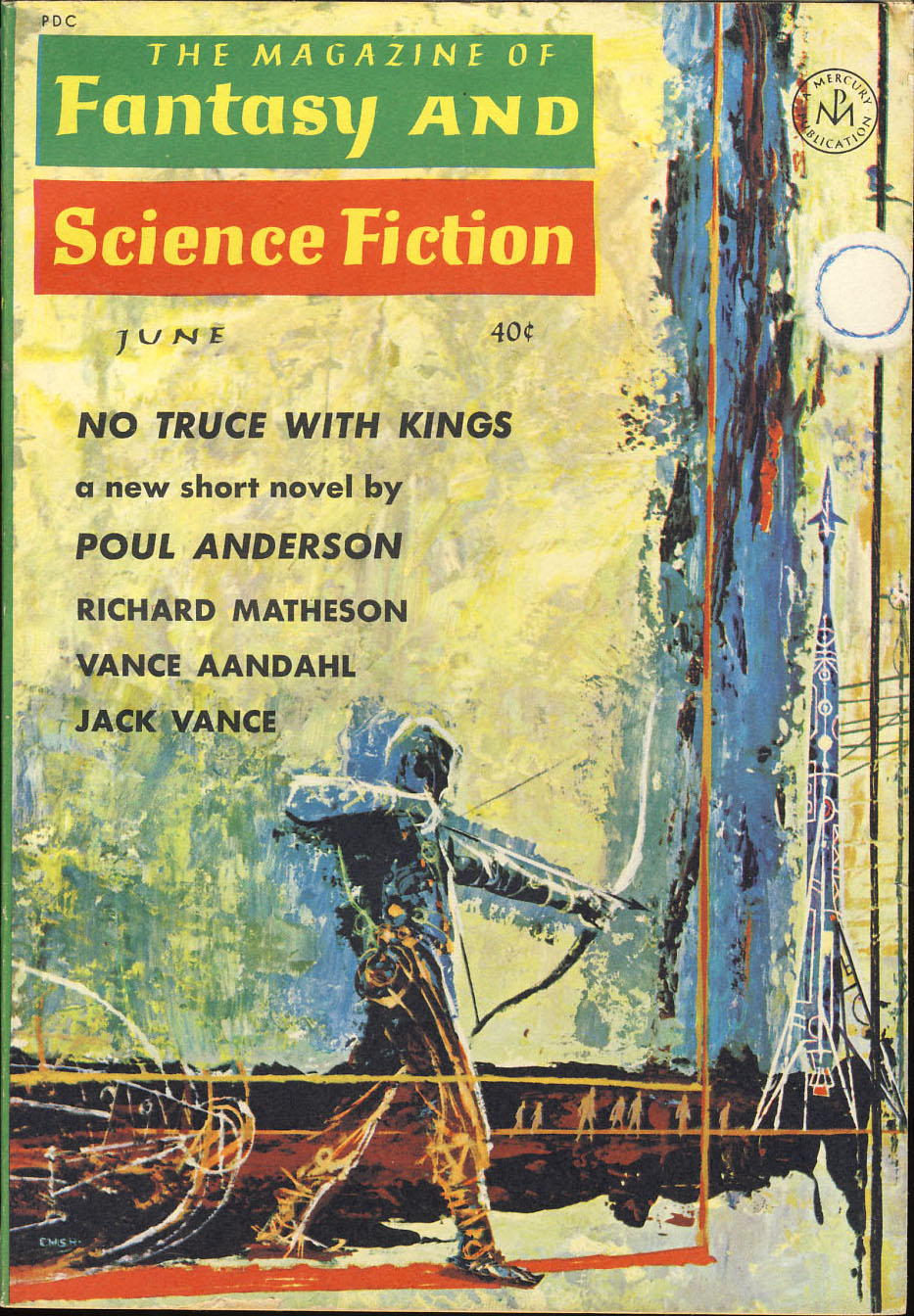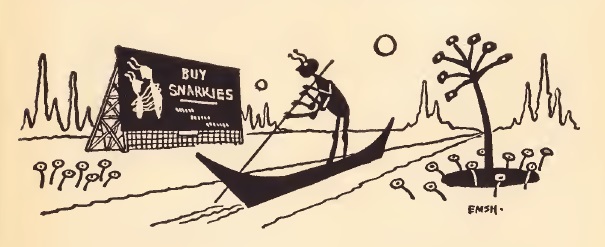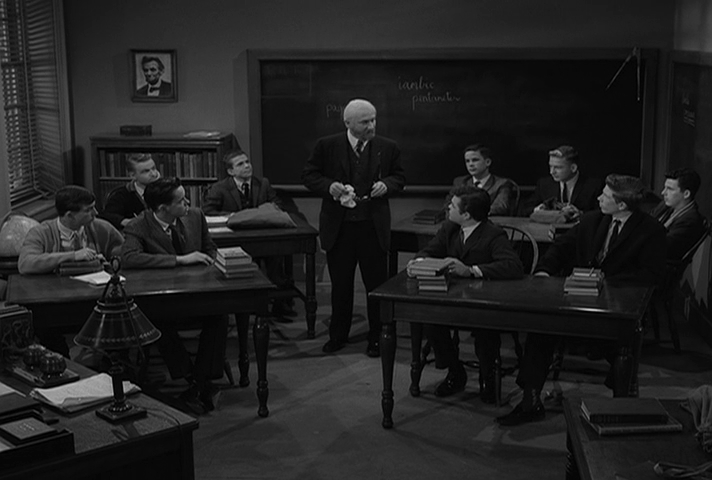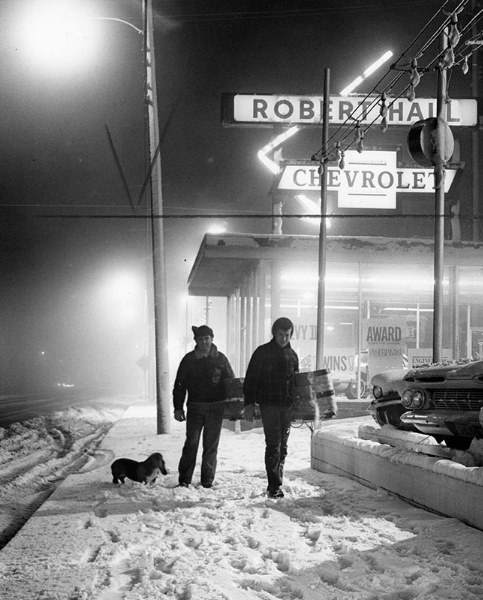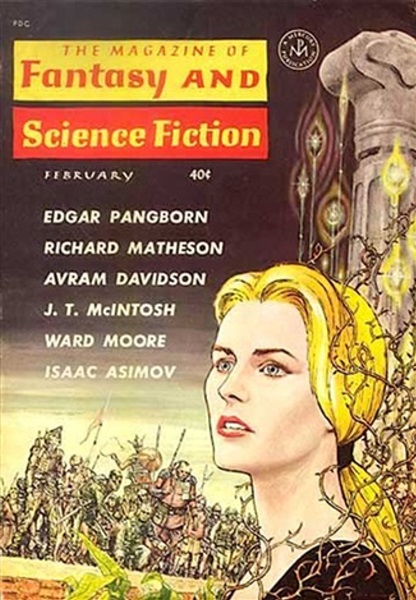
by Natalie Devitt
The characters in the most recent month of The Twilight Zone certainly encountered plenty of doubt and hesitation when they asked for help or tried to express themselves. Such entries include the family of a young woman encouraging her to get a life-altering procedure against her wishes, a teenage girl’s alien boyfriend not receiving the help he needs when he tries to warn her that aliens plan to poison the water supply, an aging spinster struggling to get people to believe that she has been receiving a series of creepy calls, and a man who is so desperate he takes the advice of a computer to get one very special woman to acknowledge his existence.
Number 12 Looks Just Like You, by Charles Beaumont and John Tomerlin

Number 12 Looks Just Like You offers a glimpse of what the year 2000 might look like. In this futuristic society, "science has developed the means to give everyone the face and body he dreams of." A young woman by the name of Marilyn, played by Collin Wilcox of To Kill a Mockingbird, is approaching her 19th birthday. She is also being pressured by her loved ones to mark the occasion with a certain rite of passage, which includes selecting a new body out of a handful of options, like she’s ordering one from a catalog. Then, undergo a procedure to transform into her new self. She is told, "The transformation is the most marvelous thing that could happen to a person." Still, she has her concerns.
Several people in this society, while attractive, look identical and everyone wears name tags so nobody confuses any of the doppelgangers. I am sure it is no coincidence that Marilyn shares a name with one of the silver screen’s most iconic beauties. Her mother, portrayed by model Suzy Parker, asks, "What’s so terrible about being beautiful? After all, isn’t everybody?" Marilyn argues that that is exactly the problem: "Is that good, being like everybody? Isn’t that the same as being nobody?"
A family member refers to her reservations about the procedure as "radical ideas" and she is also described as being a "sick girl." To make matters worse, her beliefs echo things her father said shortly before taking his own life. Can Marilyn continue to resist the intense pressure to conform?
Number 12 Looks Just Like You is good, but not excellent. It kind of feels like a lesser version of a previous entry of The Twilight Zone, Eye of the Beholder. Collin Wilcox really becomes her character, who is significantly younger than she is in real life. Then there is the episode’s conclusion, which is incredibly frightening and is probably the episode’s greatest strength. Overall, I would say that Number 12 Looks Just Like You deserves a pretty solid three stars.
Black Leather Jackets, by Earl Hamner Jr.

In Black Leather Jackets, a biker gang rides into a sleepy town wearing, you guessed it, Black Leather Jackets. Despite some similarities, Black Leather Jackets is hardly The Wild One — the three men are not members of your ordinary biker gang. In fact, they are aliens with telekinetic powers. The aliens set up shop in a vacant house. Upon the gang’s arrival, the neighbors are hardly welcoming. One of them, Stu, portrayed by Western regular Denver Pyle, describes them as, "strange type for this neighborhood." Shelly Fabares of The Donna Reed Show plays his teenage daughter, Ellen, who Stu warns to steer clear of the gang.
It is not long after the bikers move in that the electricity in Stu’s house begins turning on and off, and Ellen’s radio picks up some strange voices. While trying to determine the cause, Stu notices a large antenna on the roof of the gang‘s house. He thinks he may have found the cause of his family‘s problems, and he decides to pay their house a visit.
As it turns out, the men are much more threatening than he ever could have imagined. They are spying on others and are receiving broadcasts of orders from their alien leader. Orders to release a deadly bacteria into the water supply in order to kill Earth’s population so they can colonize the planet. The bikers erase Stu’s memories of visiting their house and send him home in a trance. He describes the men as "three very nice boys" and no longer suspects them of being responsible for the family’s poor reception.
Shortly after, a member of the group, Scott, performed by Golden Globe Nominee Lee Kinsolving, becomes romantically involved with Ellen, much to the gang’s dismay. They are ordered by their boss to "continue without him," even though he is involved with a member of a "stupid race." Scott urges Ellen to leave town and he offers to take her to safety. He warns, "Everything alive is going to be dead," but not surprisingly, he does not exactly get the help he needs.
It is worth noting that Black Leather Jackets has a plot that is remarkably similar to Teenagers from Outer Space, but is not nearly as enjoyable as the movie. Despite looking slicker than Teenagers, Black Leather Jackets is only mildly entertaining, and often unintentionally funny. The actors did an adequate job, but it is a shame that they did not have very good source material. The screenplay is hardly Earl Hamner, Jr. at his best. I did, however, enjoy Nathan Van Cleave’s jazzy score for the episode. So, I would say that this episode deserves two and a half stars.
Night Call, by Richard Matheson

Gladys Cooper makes yet another memorable appearance on The Twilight Zone with Night Call. It has not even been a year since her last performance in the enjoyable Passage on the Lady Anne. Cooper plays Elva, a disabled and elderly woman, who lives alone. One rainy night during a storm, her phone rings. When she answers, all she hears is silence. Immediately after, she receives another call with even more silence.
Elva contacts the phone company, hoping to get to root of the problem. She is informed that during the storm, some wires had fallen. Elva is told that the unusual calls could have been the result of someone to reach her or someone else on her party line during the storm. Elva continues to receive calls, which grow increasingly strange, including calls with moaning and a man saying, "Hello." She tells her caretaker, Margaret, about the calls. Unfortunately, Margaret acts like she suspects Elva is going senile.
The phone company plans to send out a worker to check on the line as soon as the weather permits, but Elva fears that the company might think of her as a "nervous old biddy falling prey to my imagination." Until a worker can check on the line, she tries leaving the phone off of the hook. But as soon as she puts it back on the hook, it starts ringing again. Things continue to escalate and now the voice on the end of the line is asking, "Where are you? I want to talk with you."
Finally, the phone company contacts her tell her that the source of the problem is likely a "fallen wire on the edge of town." But they also add, "there is no way that anyone could have called from that location." So, who is contacting Elva and why? When calls are "routed directly through The Twilight Zone," anything is possible.
What’s not to like about Night Call? Sure, it does not hurt that it was written by Richard Matheson and directed by Jacques Tourneur, who is perhaps best known for his work with Val Lewton in pictures like 1942’s Cat People. Night Call is not flashy, but it is very effective. The suspense slowly builds. It is easily one of the high points of the season, perhaps of the series. Gladys Cooper is terrific, as usual. In addition, the episode’s score, while not specifically composed for the episode, helps to compliment the episode. This is especially true in the scene that reveals Elva’s caller. Night Call easily earns its four stars.
From Agnes with Love, by Bernard C. Schoenfeld

As From Agnes with Love opens with computer programmers struggling to repair Agnes, a very sophisticated and almost human computer, but sadly nobody can get her back in working. That is, until James, played my television actor Wally Cox, arrives. He is told, "She’s been out of her mind for a week." Luckily, as soon as the "master programmer" begins to work on then malfunctioning machine, she resumes normal activity.
James might excel at work, but he struggles in his love life. After working with Agnes for a while, she begins inquiring about his love life and coaching him. Leave It to Beaver’s Sue Randall plays Millie, Jame’s co-worker, who he has a pretty intense crush on. After rejecting James several times, Millie finally agrees to a dinner date.
Agnes sends James messages with dating advice, including "Agnes knows best." She lets him know that "reckless romantic approach required" in order to win over Millie. James is book smart, but often lacks common sense, so what he does not realize is that Agnes has actually set him up for failure. When things do not work out with Millie, Agnes tries to cheer him up him by sending him the message, "Millie is a square. Better girl loves you."
While From Agnes with Love is better than some other entries with a sense of humor, it still is pretty weak. So weak, in fact, that it really requires silly musical cues to remind the audience to laugh. The narrative is incredibly predictable, and the only person surprised by anything that happens is James. As much as I hate to admit it, two stars is all that I can give From Agnes with Love.

Some of characters this month were able to overcome people's doubts, others were not so lucky. The episodes this time around varied quite a bit in terms of quality. There were two very strong offerings. The remaining two were not so memorable. All in all, a hodgepodge of a month, but mostly worth the ride.

[New to the Journey? Read this for a brief introduction!]

![[February 29, 1964] Think Twice — it's not all right (<i>The Twilight Zone</i>, Season 5, Episodes 17-20)](https://galacticjourney.org/wp-content/uploads/2019/03/640229f-672x372.jpg)


![[November 5, 1963] Beginning to see the light (November 1963 <i>Gamma</i>)](https://galacticjourney.org/wp-content/uploads/2018/11/631105cover-660x372.jpg)


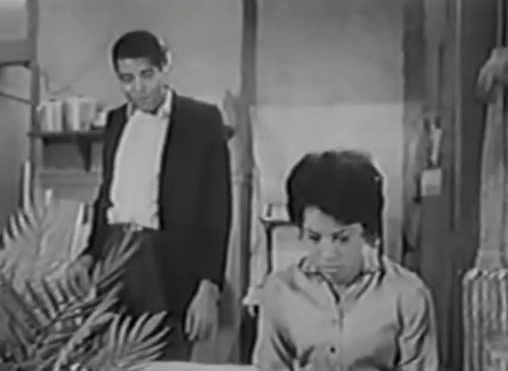







![[October 26, 1963] [Return to Form] (<i>Twilight Zone</i>, Season 5, Episodes 1-4)](https://galacticjourney.org/wp-content/uploads/2018/10/631026d-672x372.png)






![[September 17, 1963] Places of refuge (October 1963 <i>Fantasy and Science Fiction</i>)](https://galacticjourney.org/wp-content/uploads/2018/09/630917cover-672x372.jpg)





